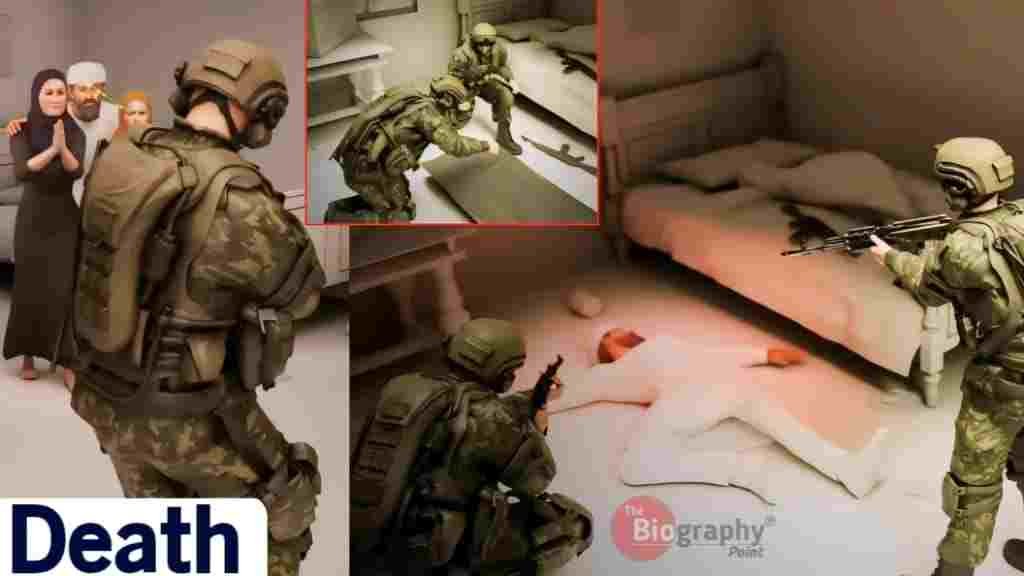| Full Name | Osama Bin Laden |
| Born Date | 10 March 1957 |
| Born Place | Riyadh, Saudi Arabia |
| Age | 54 Years |
| Mother Name | Hamida Al Attas |
| Father Name | Mohammad Bin Awad Bin Laden |
| Spouse | Najwa Ghanem |
| Religion | Islam |
| Cast | Sunni |
| Rank | General Emir of al-Qaeda |
| Year Of Service | 1984 To 2011 |
| Died Date | 02 May 2011 |
| Nationality | Saudi Arabia |
| Died Place | Abbottabad, Khyber Pakhtunkhwa, (Pakistan) |
Also Read
Early life
Osama bin Laden was born in Riyadh, Saudi Arabia on March 10, 1957, to a rich family. His dad, Mohammed bin Laden, was a really rich builder who was friends with the Saudi royal family. Osama was one of 52 kids, and he grew up in a rich family. He went to very good schools in Jeddah and was a hardworking student.
Bin Laden followed strict Islamic beliefs in his early years. His religious upbringing would impact how he sees the world and how he behaves in the future. In the late 1970s, he went to King Abdulaziz University in Jeddah to study economics and business. While he was there, he learned about radical Islamist ideas. Famous Islamic thinkers like Sayyid Qutb and Abdullah Azzam strongly influenced his beliefs.
Rise of al-Qaeda
Bin Laden’s life changed when the Soviet Union invaded Afghanistan in 1979. He thought this was an attack on Islam, so he joined the Afghan mujahideen to fight back. He used a lot of money and weapons to help the jihadist group by giving them money, weapons, and fighters
Rephrase
. This experience in Afghanistan was very important and made him believe strongly that armed struggle is necessary to fight against those who are seen as enemies of Islam.
In 1988, bin Laden started al-Qaeda, a group that wanted to fight a war all over the world. Al-Qaeda started by fighting the Soviet takeover of Afghanistan. But then it also wanted to get rid of governments that were not Islamic and to push out Western influence from Muslim countries. Bin Laden talked a lot about using violence to make a worldwide Islamic caliphate.
Lead-up to 9/11

In the 1990s, al-Qaeda did many attacks to show they were getting stronger and bin Laden had big plans. Some important events include the 1993 World Trade Center bombing and the 1998 bombings of U. S The American buildings in Kenya and Tanzania and the attack on the USS Cole in Yemen in 2000. These attacks showed that al-Qaeda can hit important places and predicted the terrible events of September 11, 2001.
Bin Laden’s beliefs were fueled by a mix of strong religious feelings and complaints about politics. He said bad things about the United States. foreign policies, especially America’s help for Israel, the existence of U. S Soldiers in Saudi Arabia, which is important to Islam, and the punishments on Iraq. He said he was fighting to defend the Muslim world from being controlled by the West.
September 11, 2001
The September 11 attacks were a very important event in recent history. That day, 19 al-Qaeda terrorists took control of four planes and crashed two into the Twin Towers in New York City and one into the Pentagon in Washington, D. C The fourth plane crashed in Pennsylvania after passengers tried to take control back from the hijackers. Almost 3,000 people died, and the attacks cost billions of dollars in damage.
At first, Bin Laden said he had nothing to do with it. But later he admitted he did it and said it was because of something the U. S Rules in the Middle East. The attacks made countries work together to stop terrorism. This led to the U. S invading Afghanistan in October 2001. The aim was to break up al-Qaeda and get rid of the Taliban government that protected bin Laden.
Post-9/11 and the Global War on Terror
After 9/11, bin Laden was the most wanted person in the world. The United States Started Operation Enduring Freedom in Afghanistan, which removed the Taliban from power but did not catch bin Laden. He escaped being caught for almost ten years by hiding in the mountains near the border between Afghanistan and Pakistan.
The United States. The reaction to 9/11 went beyond just Afghanistan. It also led to the controversial invasion of Iraq in 2003. The reason for going to war in Iraq was partly because people believed that Saddam Hussein’s government had dangerous weapons and connections to terrorist groups like al-Qaeda. However, these statements were later proven to be false, and the war went on for a long time with a lot of people getting hurt and the government becoming unstable.
Ideological Impact and Legacy

Bin Laden’s beliefs and methods have had a big effect on global terrorism that continues to this day. Al-Qaeda inspired many groups around the world to carry out terrorist attacks. They promote a way of doing terrorism where small groups work on their own without needing orders from a central headquarters. Other groups, like the Islamic State (ISIS), have copied this model. ISIS became well known in the middle of the 2010s.
Bin Laden’s efforts to spread his message were very important in getting people to believe what he was saying. He made many videos and recordings and used modern technology to reach people all around the world. He was good at expressing complaints about the West and making himself seem like a protector of Islam. This made some unhappy Muslims feel connected to him, and it led to more people becoming radical and joining terrorist groups.
Death and Aftermath

On May 2, 2011, in the United States, Navy SEALs secretly went to Abbottabad, Pakistan, and killed Osama bin Laden. President Barack Obama ordered a mission that ended a nearly ten-year search for someone. Bin Laden’s death hurt al-Qaeda, but it didn’t stop global terrorist attacks.
After bin Laden died, al-Qaeda kept doing things but became less powerful as ISIS became more important. ISIS became very powerful in 2014 and started to use very cruel methods. They wanted to create their own country and were very focused on controlling land.
Conclusion
Osama bin Laden did things that will always be remembered in the world. He was the leader of al-Qaeda and planned some of the worst terrorist attacks ever. This changed the way countries keep themselves safe. His skill at combining strong beliefs with good planning made him a powerful person in the world of terrorism.
The effects of what bin Laden did still affect us today. The worldwide fight against terrorism that started after 9/11 has caused big changes in politics, the military, and society. It has also caused arguments about keeping people safe and protecting their rights, why terrorism happens, and the best ways to stop violent extremism.
Many people felt that Bin Laden’s death was a kind of payback for what he did, but it also showed that the fight against terrorism is still going on. The fight he started with his ideas is still going on, as new groups and leaders join the cause of global jihad. It’s important to understand bin Laden’s life and what he left behind in order to understand the complicated problem of terrorism and how we are trying to stop it.
Frequently Asked Questions (FAQs) About Osama Bin Laden Biography
Q. Who was Osama bin Laden?
Osama bin Laden was the founder and leader of the militant Islamist organization al-Qaeda.
Q. When and where was Osama bin Laden born?
He was born on March 10, 1957, in Riyadh, Saudi Arabia.
Q. What was Osama bin Laden’s family background?
Bin Laden came from a wealthy Saudi family with significant business interests. His father, Mohammed bin Laden, was a billionaire construction magnate.
Q. What is al-Qaeda?
Al-Qaeda is a militant Sunni Islamist multi-national organization founded by Osama bin Laden in 1988. It aims to eliminate Western influence in Muslim countries and establish Islamic regimes based on Sharia law.
Q. What were bin Laden’s main grievances against the United States?
Bin Laden opposed U.S. support for Israel, its military presence in the Middle East, and its interference in Muslim countries.
Q. What was the role of Osama bin Laden in the 9/11 attacks?
Bin Laden was the mastermind behind the September 11, 2001, terrorist attacks in the United States, which involved the hijacking of four airplanes and resulted in nearly 3,000 deaths.
Q. Where was bin Laden hiding after 9/11?
After 9/11, bin Laden initially hid in Afghanistan. He later moved to Pakistan, where he was eventually found.
Q. How long did the U.S. search for Osama bin Laden?
The U.S. searched for bin Laden for almost a decade after the 9/11 attacks.
Q. Where and when was Osama bin Laden killed?
He was killed on May 2, 2011, by U.S. Navy SEALs during a raid on his compound in Abbottabad, Pakistan.
Q. What was Operation Neptune Spear?
Operation Neptune Spear was the code name for the mission that led to the killing of Osama bin Laden.
Q. How did bin Laden’s death impact al-Qaeda?
Bin Laden’s death was a significant blow to al-Qaeda, but the group continued its operations under new leadership.
Q. Who succeeded Osama bin Laden as the leader of al-Qaeda?
Ayman al-Zawahiri, bin Laden’s deputy, succeeded him as the leader of al-Qaeda.
Q. What was bin Laden’s ideology?
Bin Laden promoted a radical form of Sunni Islam, advocating for violent jihad against what he viewed as enemies of Islam, particularly the United States and its allies.
Q. How did bin Laden fund al-Qaeda?
Bin Laden used his personal wealth and donations from supporters to fund al-Qaeda’s operations.
Q. What was the impact of bin Laden’s actions on global terrorism?
Bin Laden’s actions significantly escalated global terrorism, leading to numerous attacks worldwide and prompting the U.S. War on Terror.
Q. Did bin Laden issue any public statements?
Yes, bin Laden issued numerous video and audio messages, outlining his grievances, justifying attacks, and calling for jihad.
Q. What was bin Laden’s role in the Soviet-Afghan War?
Bin Laden joined the Afghan mujahideen in fighting against the Soviet invasion of Afghanistan in the 1980s, which was a formative experience for his later activities.
Q. Was bin Laden ever captured or imprisoned before his death?
No, bin Laden was never captured or imprisoned before his death.
Q. How has bin Laden been portrayed in popular culture?
Bin Laden has been portrayed in various forms of media, including films, documentaries, books, and television shows, often as the personification of global terrorism.
Q. What is the legacy of Osama bin Laden?
Bin Laden’s legacy is one of violence and extremism, with his actions having a lasting impact on international security, counterterrorism policies, and global geopolitics.












Comments are closed.